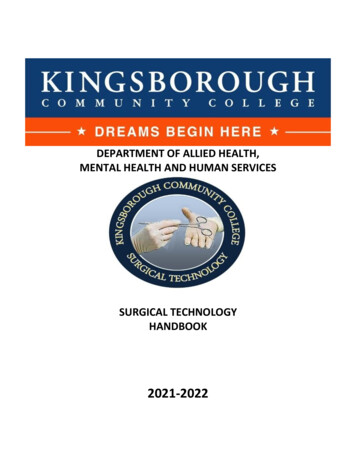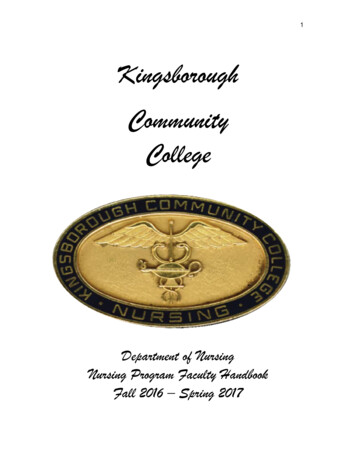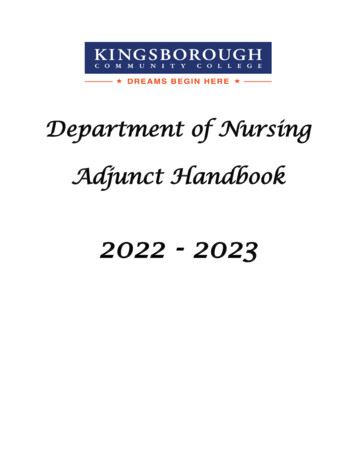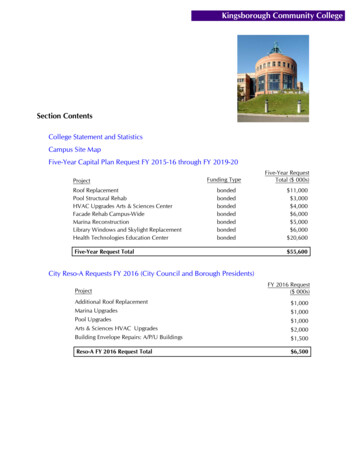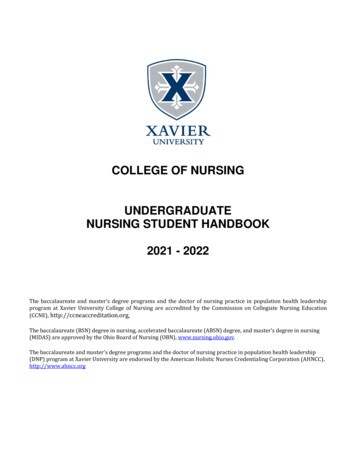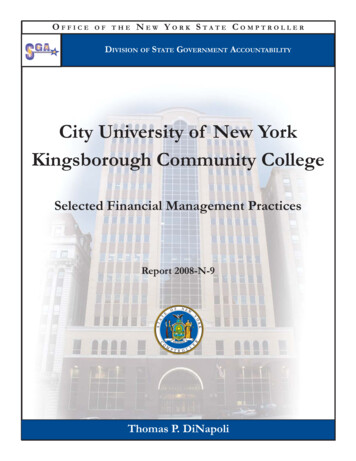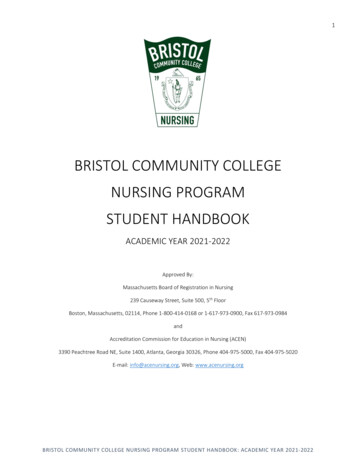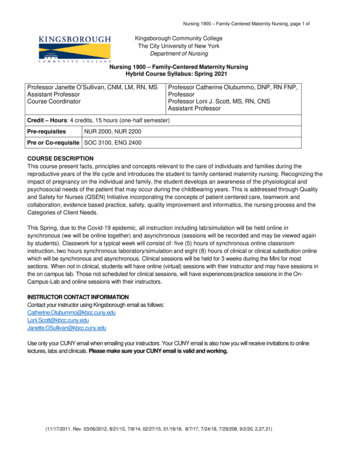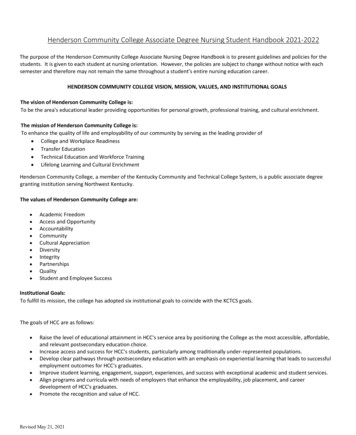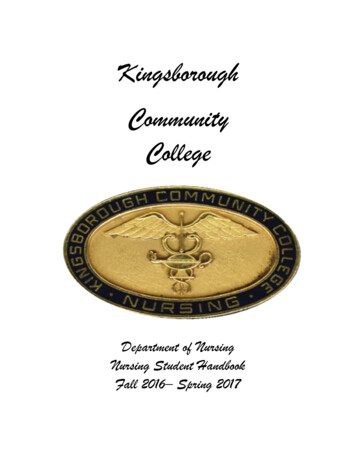
Transcription
KingsboroughCommunityCollegeDepartment of NursingNursing Student HandbookFall 2016– Spring 2017
Nursing Department Student Handbook, Page 2 of 30Welcome to the Department of NursingOn behalf of the Faculty and staff of the Department of Nursing, We are pleased to welcomeyou to the Nursing Program. We hope that you will have a gratifying, scholarly journey as anursing student here at Kingsborough Community College.This handbook contains valuable information to facilitate your achievement of academic andprofessional excellence as a nursing student. Please keep it as a reference throughout yournursing education. It is a supplement to the College Catalog and College StudentHandbook. All information contained in this handbook is subject to change. Changes willbe published as they occur.The Handbook is on the department website – Please download it if you lose this copy.Professor Bridget Weeks, Chairperson, Department of Nursing
Nursing Department Student Handbook, Page 3 of 30Table of ContentsNURSING PROGRAM INFORMATION . 5Mission Statement .5Nursing Program Outcomes .5Program Student Learning Outcomes .5Role Specific Graduate Competencies .6Organizational Framework .6Role of the Associate Degree Nurse (ADN) .6Program Information .7INFORMATION FOR APPLICANTS AND PRE-CLINICAL STUDENTS . 7Essential Performance Standards for Clinical Nursing Students .7Nursing Program Components .9Enrollment in the Nursing Curriculum .9Students with Disabilities .10Transfer Students .10Entrance Requirements .10Advanced Placement for Licensed Practical Nurses .12Rules of Professional Conduct for Registered Nurses .12Nursing Profession Resources .13INFORMATION FOR CLINICAL STUDENTS.13Clinical Course Requirements .13Fees and Expenses .14Criteria for Retention in the Nursing Program .15Blackboard .15Distance Learning .15Assessment Technology Institute (ATI) .15Skills Review .16Civic Engagement .16Preparation for the Clinical Experience .16Standard Precautions .16Confidentiality .17Dress Requirements .17Student Rights and Responsibilities .18POLICIES .18Attendance Policies .18Classroom Behavior .19Exam policy .19Grading Policies for Nursing Courses .19Grade Appeals.20Drug Calculation Review Policy .20Fatigue .20Netiquette .21Civility .21Plagiarism.21
Nursing Department Student Handbook, Page 4 of 30Use of Mind-Altering Substances .21The KCC Code of Conduct .22Integrity.22Accidents / Injury / Incidents During Clinical Experiences .22Student Employment .23Faculty and Student Communication .23GOVERNANCE .24Student Participation in Governance.24Curriculum Committee .24Nursing Student Club.24Nursing Student Club Bylaws .24Duties of the Officers .24SERVICES.25Clinical Advisement .25Tutoring Services .26Financial Aid .26KCC Selected Student Resources .26NURSING ACADEMIC COURSES .26Clinical Courses.26Nursing Elective Courses .29
Nursing Department Student Handbook, Page 5 of 30NURSING PROGRAM INFORMATIONMission StatementThe mission of the Nursing Program at Kingsborough Community College is to developcompetent Professional Nurses who are eligible for licensure. An appropriate balance betweengeneral education and Nursing courses prepares students with the competencies to providesafe, caring, patient-centered, evidenced-based Nursing care to culturally diverse populations.Graduates are prepared for entry into practice, articulation with institutions of higher learning,and engagement in life-long learning. The administration and faculty are committed to offering asuperior education to Nursing students that will prepare them to practice as Professional Nursesin accordance with national standards.Nursing Program OutcomesAt a minimum, the Kingsborough Community College Nursing Program will achieve thefollowing outcomes: Achieve the national mean pass rate percentage for first time test takers on the NCLEXRN examination 75% of graduates will have completed the Clinical Component of the program within threeyears of beginning Clinical Nursing courses. Secure program satisfaction by graduates at a level of 80%. Secure program satisfaction by employers at a level of 80%. Realize a graduate job placement rate of 75%Program Student Learning OutcomesUpon completion of the Kingsborough Community College Nursing Program, utilizing theNursing Process, the student: Provides safe, caring, patient-centered, evidence based Nursing care to a diversepopulation of patients.Employs critical reasoning strategies.Engages in teamwork and collaboration with members of the intra-professional team.Employs informatics principles, techniques and systems when providing Nursing care.Demonstrates leadership/management in a variety of healthcare settings for the purposeof providing and improving patient care.Applies professional, ethical and legal principles relevant to the practice of a registerednurse.
Nursing Department Student Handbook, Page 6 of 30Role Specific Graduate CompetenciesUpon completion of the Kingsborough Community College Nursing Program the graduate willdemonstrate competency in the following areas:1.2.3.4.5.6.Safe, Evidence-Based CareCritical ntLegal/Ethical/AdvocacyOrganizational FrameworkTo realize the Nursing Program’s Mission, Program Outcomes, Student Learning Outcomes,and Role Specific Graduate Competencies the curriculum is grounded in recognizedcontemporary professional standards, guidelines and competencies which include ACEN 2013Standards and Criteria for Associate Degree Nursing , NLN Associate Degree Competencies,ANA Standards of Nursing Practice, New York State Nurse Practice Act, National Council ofState Boards for Nursing’s (NCSBN) NCLEX-RN Test Plan Categories of Client Needs, TheJoint Commission (TJC) National Patient Safety Goals (2015), and Quality and Safety forNurses (QSEN) Competencies.The QSEN Competencies together with the NCLEX-RN Categories of Client Needs provide themajor unifying themes for application of the Nursing Process and for content and studentlearning throughout the curriculum. These are introduced in the first semester of the NursingProgram’s Clinical Component and are applied at increasingly complex levels in successivesemesters in the classroom, laboratory and clinical settings. The Student Learning Outcomesorganize the curriculum, guide the delivery of instruction and learning activities, and are used toevaluate student progress. The Nursing curriculum and Student Learning Outcomes advancefrom simple to complex utilizing Bloom’s revised Taxonomy of Learning Objectives.The Nursing faculty integrates Knowles Theory of Adult Education in applying educationaltheory appropriate for student learning. This theory promotes the development of criticalthinking, clinical judgment, and the delivery of excellence in patient-centered care to adultstudents who make up the major demographic in the Nursing Program.Role of the Associate Degree Nurse (ADN)Nursing practice takes place at differentiated levels. The Associate Degree Nurse is an entrylevel practitioner and is competent to practice as a direct caregiver in a variety of health caresettings which include diverse patient populations. The ADN practices in the roles of provider ofcare, manager of care, and member within the discipline of Nursing. The ADN graduate isprepared to provide care for groups of individuals with multiple problems and with a high level ofacuity in multiple settings using current standards of care and research findings to inform andguide his/her Nursing practice. The ADN graduate is also equipped with the ability to performproficiently in an increasingly technological healthcare arena. The practice of the ADN isconsistent with the guidelines of the Nurse Practice Act and the American Nurses AssociationCode of Ethics.
Nursing Department Student Handbook, Page 7 of 30The ADN uses effective communication skills and collaborates with patients and other healthteam members to coordinate care. The ADN prioritizes and delegates the delivery of nursingcare and evaluates outcomes. The ADN graduates are employed in a health care deliverysystem that continues to grow and change. As a result, ADN graduates are encouraged topursue bachelors, masters and doctoral degrees in preparation for advanced levels of practice.Program InformationKingsborough Community College is accredited by the Middle States Commission on HigherEducation and offers a Nursing Program that is approved by the New York State EducationDepartment. This nursing education program is accredited by the Accreditation Commission forEducation in Nursing; 3343 Peachtree Road NE, Suite 850, Atlanta, Georgia 30326. Thegraduate receives an Associate in Applied Science Degree and is eligible to take the NationalCouncil Licensure Examination for Registered Nurses (NCLEX-RN).INFORMATION FOR APPLICANTS AND PRE-CLINICAL STUDENTSEssential Performance Standards for Clinical Nursing StudentsNursing is a practice discipline with cognitive, sensory, affective and psychomotor performancerequirements. Patient safety is dependent on the nursing student’s ability to meet the followingEssential Performance Standards. These standards are a part of each nursing course. It isrequired that every Clinical student meets these standards to be able to engage in learningactivities that will not endanger students, faculty or patients. Determination is made on anindividual basis as to whether or not necessary accommodations or modifications can be madereasonably while assuring patient safety.IssueCriticalThinkingStandardSome Examples of Necessary Activities(Not all inclusive)Critical thinking ability sufficient Identify cause-effect relationships in clinicalfor clinical judgment.situations. Develop unfolding nursing care plans. Demonstrate ability to calculate, measure &analyze within allotted time frame. Employ Analytical thinking.- Transfer knowledge from one situation toanother.- Process information.- Evaluate outcomes.- Problem solve.- Prioritize tasks.- Use short and long term memory. Utilize critical reasoning.- Identify cause-effect relationships.- Plan/control activities for others.- Synthesize knowledge and skills.- Sequence information.
Nursing Department Student Handbook, Page 8 of 30IssueStandardSome Examples of Necessary Activities(Not all inclusive)Communication Communication abilitiessufficient for accurate, timelyand efficient perception,interpretation, andcommunication of informationin English, including verbal,written, and non-verbal wheninteracting with others. Explain treatment procedures. Initiate health teaching. Respond to and interpret health careprovider orders. Direct assistive staff. Write legibly and correctly. Document and interpret nursing care actionsand patient outcomes. Use computerized documentation skills.InterpersonalInterpersonal abilities sufficientto interact with individuals,families and groups from avariety of social, emotional,cultural, religious andintellectual backgrounds. Establish rapport with patients, family, staff,teacher and peers. Negotiate interpersonal conflict. Respect differences in patients. Maintain composure when subjected to highstress levels.MobilityPhysical abilities sufficient to Lift (at least 30 pounds).move from room to room, Bathe, position, transfer and transportmaneuver in small spaces, and patients.navigate stairwells. Move around in patient’s rooms, workspaces and treatment areas. Administer nursing procedures. Move efficiently enough to meet the needsof several patients in a timely manner. Perform patient care in emergency and nonemergency situations. Possess full manual dexterity of the upperextremities, including the neck andshoulders. Possess unrestricted movement of bothlower extremities, back and hips. Possess ability to touch the floor to removeenvironmental hazards. Possess ability to sit, bend, reach, walk andstand for the entire length of the clinicalexperience. Possess ability to sustain repetitivemovements (e.g., CPR).Motor SkillsGross and fine motor abilitiessufficient to provide safe andeffective nursing care. Calibrate and use equipment. Administer injections. Insert and/or maintain patientcatheters/tubes. Operate equipment and devices, such asthermometers, B/P cuffs, IV pumps,ventilators. Position patients.
Nursing Department Student Handbook, Page 9 of 30IssueStandardSome Examples of Necessary Activities(Not all inclusive) Operate equipment and devices inemergency situations.HearingAuditory ability sufficient tomonitor and assess healthneeds. Respond to all signals, alarms and otherdisplays indicating immediate patient need. Auscultate and hear cardiac, lung andabdominal sounds. Hear patient and team membercommunicationsand telephone communications.VisualVisual ability sufficient forobservation and assessmentnecessary in nursing care. Observe/assess pertinent body systemsincluding inspection of respirations,temperature, BP, and color. Observe/assess medical equipment,including calibrated scales, such as,monitors, syringes, manometers, oxygen.TactileTactile ability sufficient forphysical assessment andtherapeutic intervention. Perform palpation (feel for pulses, lumps),percussion (short quick blows by thefingers), usually to the chest or abdomen, toobtain a sound or the determination ofdensity, size or position. Detect variations in temperature.Nursing Program ComponentsAdmission to Kingsborough Community College does not guarantee admission to the NursingProgram. The Nursing Program consists of two components: Pre-Clinical. Clinical.To obtain specific information about college admission requirements and/or to obtain anapplication contact: Admissions Information Center or call 1 718 COLLEGE. To enter theClinical Component, students must first complete the Pre-Clinical Sequence of the programAdvisement for Pre-Clinical Nursing Students is located in the Academic Advisement Center forAllied Health Career, located in M201 or call (718) 368-5744.Enrollment in the Nursing CurriculumStudents must be enrolled in the Pre-Clinical student group. Students who are not officiallydesignated in the Pre-Clinical student group must apply for a Change of Curriculum during thetime period noted on the official academic calendar of the college. This calendar is available onthe KCC website or can be obtained at the Office of the Registrar, A-101.In order to request a change of curriculum, you must obtain the Change of Curriculum form atthe Office of the Registrar, meet with your advisor to discuss your academic performance andobtain your advisor’s signature. If you do not know whom your advisor is, go to room A-216,Office of the Dean of Students. After obtaining your advisor’s signature, you must obtain the
Nursing Department Student Handbook, Page 10 of 30signature of the chairperson or designee of the department of your “current curriculum.” Lastly,you leave your completed form at the Nursing department office, M 401. After final grades havebeen recorded for the semester in which you submit a change of curriculum, your request isreviewed by the Nursing Department. The Registrar will notify students when the change is ineffect.Students with DisabilitiesAccess-Ability Services (AAS) serves as a liaison and resource to the KCC communityregarding disability issues, promotes equal access to all KCC programs and activities, andmakes every reasonable effort to provide appropriate accommodations and assistance tostudents with disabilities. Your instructor will make the accommodations you need once youprovide documentation from the Access-Ability office (D-205). Please contact AAS forassistance.Transfer StudentsStudents who wish to transfer into the nursing curriculum from other colleges must meet thecriteria for admission into the nursing curriculum. Students must file an Application for AdvancedStanding during the time period noted on the Academic Calendar. Official transcripts must besent to the Registrar’s Office and an evaluation of your previous course work will be done. Asper college policy, no more than 30 credits may be transferred. All grades for Pre-Clinicalcourses will be used to calculate the Pre-Clinical grade point average.Entrance RequirementsTo be considered for the Clinical Component of the Nursing Program, a student must complywith the following:1. be enrolled in the Pre-Clinical Component. Student must complete an application forPre-Clinical Nursing during the period noted on the Academic Calendar. The applicationis obtained in the Registrar’s Office. The student must see a nursing counselor todiscuss their academic performance and obtain a advisor’s signature on the application.The application is submitted to the Nursing Department (M401);2. pass the CUNY Reading and Writing exams and parts 1 and 2 of the COMPASS MathSkills Test and/or complete any required developmental courses before completion ofthe four (4) courses in the Pre-Clinical Sequence;3. complete the four (4) courses in the Pre-Clinical Sequence: ENG 1200, PSY 1100, BIO1100 and SCI 2500;4. complete the four courses the Pre-Clinical Sequence with at least a grade point averageof 2.5 and earn at least two (2) Bs (one of which must be in SCI 2500 or BIO 1100);5. the student who has repeated and/or withdrawn from any of the Pre-Clinical Sequencecourses may not be considered for admission to the Nursing program;6. all grades received for courses taken in the Pre-Clinical Sequence at Kingsborough willbe included in the Pre-Clinical average computation;7. submit transcripts from other colleges (NOTE: Letter grades received in the Pre-ClinicalSequence courses at other colleges will be used to determine eligibility for admission);any biological science course more than 10 years old will not be accepted for exemptionor credit;8. perform satisfactorily on the Test of Essential Academic Skills (TEAS) exam.
Nursing Department Student Handbook, Page 11 of 309. the transfer student from other colleges must be in good academic standing. A studentwho is on academic probation or has been administratively dismissed from a Nursingprogram at a previous school is not eligible for admission to the Nursing program;10. the student must earn a minimum of “C” in all pre- and co-requisite courses inclusive ofBIO 1200, BIO 5100, ENG 2400, PSY 3200, and SOC 3100. Students who haverepeated and/or withdrawn from these courses may not be considered for admission tothe Nursing Program.PLEASE NOTE WELL: All current CUNY Clinical Nursing students must providedocumentation as to legal status in one of these categories:a. U.S. Citizenship.b. Permanent residency.c. International Student with F1 status.d. Granted Asylum, Refugee Status, Temporary protected Status, Withholding ofRemoval, or Deferred Action Status by the U.S. Government.Notice to Students on Criminal Background Checks- Current laws generally permit a state licensing board or agency to deny a license topractice nursing if the applicant has been convicted of a felony or other specified crime.Like many state licensing boards, the Office of the Professions of the New York StateEducation Department requires that a criminal background check be conducted prior togranting a license to practice nursing.- The Department of Nursing at Kingsborough Community College does not require acriminal background check for admittance, but the Department’s educationalrequirements include placement at one or more hospitals or other off-campus clinicaltraining sites and these sites frequently require a student to undergo a criminalbackground check before the student can be placed for clinical training. If, based uponthe results of a criminal background check, the site determines that a student’sparticipation in its clinical training program would not be in the best interest of the site,the site may deny that student admission to the training program. Even if the studenthas already begun the placement when the results are received, the site may elect todismiss the student, regardless of the student’s performance while in the trainingprogram.- Each clinical training site that requires a criminal background check sets its ownstandards and procedures and you may be asked by the site to pay the cost of thebackground check. You may also have to complete more than one criminal backgroundcheck during the course of the Nursing Program at Kingsborough Community College,depending on the number of sites where you are placed and the requirements of eachsite.- Please note that if a clinical training site determines that you may not take part in itstraining program based on the results of the criminal background check, you may beunable to complete your course requirements and to continue in the Nursing program.IT IS IMPORTANT FOR YOU TO CONSIDER THIS BEFORE YOU ENROLL IN THENURSING PROGRAM. Kingsborough Community College has no obligation to refundyour tuition or fees or to otherwise accommodate you in the event you are ineligible tocomplete your course requirements based on the results of a criminal backgroundcheck, or if you are denied a license to practice nursing.
Nursing Department Student Handbook, Page 12 of 30Students who successfully complete the prescribed Pre-Clinical Sequence requirementsmust file for an application to take the ATI-TEAS exam and an application for acceptanceinto the Clinical Component of the Nursing Program. Completion of the aboverequirements does not guarantee admission into the Clinical Component; Admission tothe Clinical Component is based on space availability, the Pre-Clinical Sequence gradepoint average and Test of Essential Academic Skills (TEAS) results. Candidates areranked based on their Pre-Clinical GPA and the TEAS results.Application forms and specific filing dates for the Clinical Component of the NursingProgram are available in the Nursing Department office, MAC 401. The completed formshould be filed in that office during the Spring or Fall semester in which the student expects tocomplete the Pre-Clinical requirements. Students completing the requirements during theSummer or Winter module should file their application in the following Fall or Spring semester.Advanced Placement for Licensed Practical NursesLicensed practical nurses (LPN) who are accepted into the Clinical Component may receivecredit for NUR 1800 (Fundamentals of Nursing) by earning a score of Level 2 or better on theATI Proctored RN Fundamentals Exam. These candidates may receive credit for NUR 1700(Calculations for Medication Administration) by achieving a grade of "B" or better on theDepartment of Nursing’s NUR 1700 final examination. Candidates wishing to earn these creditsby examinations must meet with the Department Chairperson.Rules of Professional Conduct for Registered NursesIn order to be licensed as a Registered Professional Nurse in New York State you must: Be of good moral character. Be at least eighteen years of age. Meet professional education and examination requirements.All licensed professional registered nurses must adhere to rules of professional conduct. TheNew York State Education Law includes definitions of professional misconduct and the Board ofRegents has rules defining unprofessional conduct. The New York State Education Department(SED), Office of the Professions investigates all applicants who have a prior criminalconviction(s) and/or pending criminal charges (felony or misdemeanor). Following itsinvestigation, a determination will be made as to the applicant's eligibility for licensure.The Board of Regents defines professional misconduct as the failure of a licensed professionalto meet expected standards of practice. To ensure public protection, SED’s Office of theProfessions investi
Department of Nursing . Nursing Student Handbook . Fall 2016- Spring 2017 . Nursing Department Student Handbook, Page 2 of 30. Welcome to the Department of Nursing . . Nursing is a practice discipline with cognitive, sensory, affective and psychomotor performance requirements. Patient safety is dependent on the nursing student's ability .
